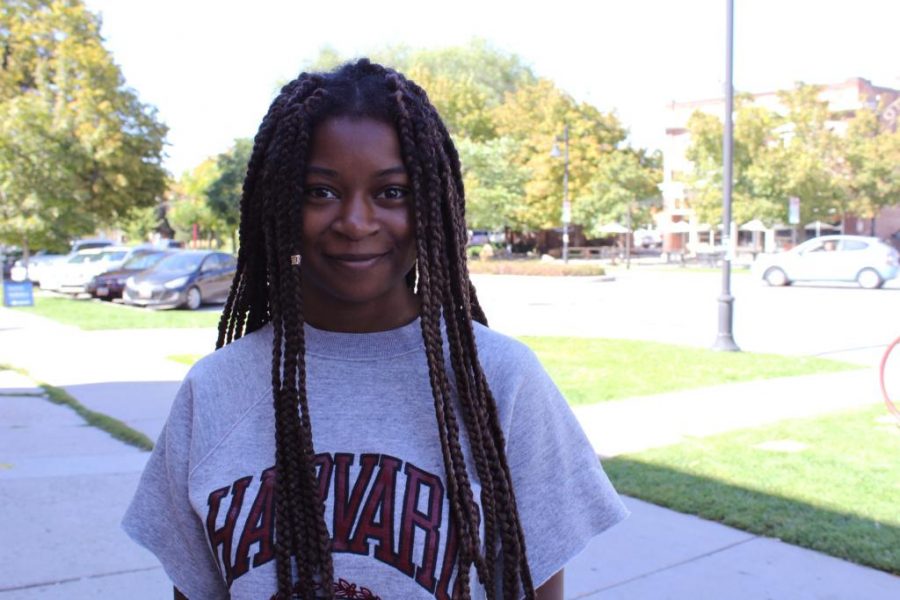
Emily Anderson
Grace, a 17-year-old high school student, was rendered unconscious when she got in a fight with an older man during a protest opposing Ben Shapiro speaking at the University of Utah on September 27, 2017.
When 17-year-old Grace graduates from high school, she plans to study political science and economics. When she went to the University of Utah on Sept. 27 to protest Ben Shapiro speaking on campus, she didn’t plan on getting in a fight.
Grace describes herself as politically active. She became interested in social justice after Michael Brown was shot by police in Ferguson, Missouri, in 2014. The death of the unarmed, black 18-year-old inspired Grace to get involved in activism.
“We are entitled to our anger,” Grace said. “There’s stuff happening that justifies anger and shouting and all of that stuff.”
Her mother was worried about Grace attending the protest at the U. She had read about the death of Heather Heyer at a protest against white supremacy in Charlottesville, Virginia, and was concerned that something similar could happen to her daughter. Grace reassured her mother that at the numerous protests she had participated in, she had never seen violence.
When she attended the rally at the U, however, Grace found herself at the center of an altercation.
Grace said she was standing on a set of stairs near the Social and Behavioral Science Building, where Shapiro was speaking, when she heard a man telling a woman that black people blame all of their problems on white people and that black people are the most violent group in the U.S.
She decided to step in, asking, “Why do you keep talking about black people?”
As she grew tired of his arguments, Grace said she turned away. Then he called her a “dumb, broke nigger.”
In response, Grace slapped the man.
“It was kind of like a knee-jerk reaction to hit him,” Grace said. “I wasn’t purposefully thinking, ‘You’ve got to hit this person.’ But I didn’t expect him to roundhouse me twice.”
The man hit Grace once on the side of her head, then on the top of her head as she collapsed.
Grace said she was rendered momentarily unconscious and her memory of the event was foggy for the rest of the night. A member of the U’s faculty drove her home, and police sent an EMT to her house to check for a concussion — which they cleared her of.
When speaking with a police officer about the altercation, Grace said the officer told her she wouldn’t face any charges.
“He said even if I had been 18, and I had hit him first and he claimed self-defense, he knocked me out afterwards,” Grace said. “So, the person who gets hurt the most is the victim.”
The Daily Utah Chronicle could not contact the other individual involved in the fight, but Grace estimated he was above 30.
Grace began being harassed online after videos surfaced of the incident. Some individuals left comments on the video saying that because she hit the man first, she deserved his response.
“She experienced a little bit of equality in his reaction to her punching him in the face,” wrote Twitter user @Webslinger64.
Others, however, made much more personal attacks on her social media pages. To avoid further online torment from the latter group, Grace asked not to have her last name included in this article.
In its own online posts, the U characterized the protest as peaceful.
“Tonight was a good example of how free speech should look on a university campus,” the school wrote on Twitter. “Passionate people, nonviolently expressing their opinions.”
Grace took issue with that statement. She said she wishes the U would have acknowledged that not everyone was safe that night.
Despite the harassment and what she felt was disregard from the U, Grace said she does not regret her actions.
“If I had to get punched two more times to hit him again, I would punch him again,” she said.
Popular conservative commentator Steven Crowder made a video of protesters at the U in which he claimed to uncover ANTIFA, a political movement opposing fascism, as an indiscriminately violent group. Crowder characterized Grace as someone who identifies as part of the movement.
“I was like, ‘Since when am I in this group? I’m so confused,’” Grace said. “But I always go to the rallies, the protests, the marches and I see them and I support them — I always will.”
Part of the reason Crowder mistook her as involved with ANTIFA, Grace believes, is because conservatives don’t listen.
“They always go on and on about how they want people to come up to them, like let’s start an open discussion,” Grace said. “But they don’t really want to talk. They just want to shout at you what they think they know, and then when you try to say something, they say, ‘Look at her being angry, not wanting to listen to someone just because they oppose their beliefs.’”
Grace feels that the protest opposing Ben Shapiro, juxtaposed with the counter-protest, reflects a greater rift in American society. She plans to continue fighting against words and opinions that she views as exclusionary.
“It all comes down to the fact that hate speech is not free speech. I’m not going to let anyone make them synonymous — they’re not the same thing and will never be the same thing. People aren’t entitled to tell lies or bigotry on campus or anywhere.”
@emilyreanderson
e.anderson@dailyutahchronicle.com
